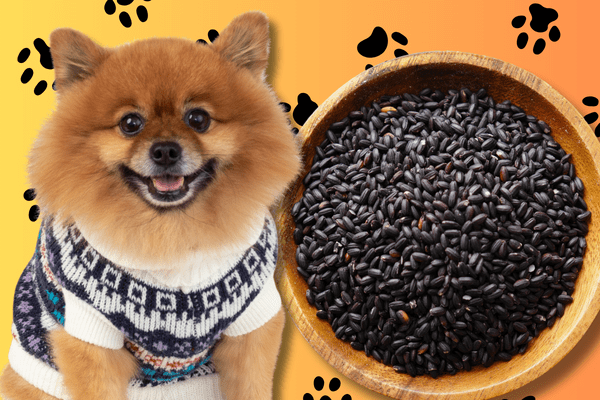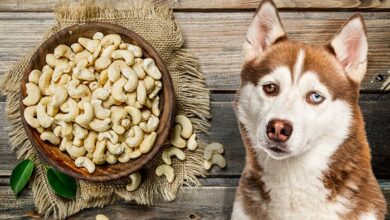Can Dogs Eat Black Rice? A Pet Owner’s Guide to Safe Snacking-2024

Can Dogs Eat Black Rice? Black rice, often called “forbidden rice,” stands out for its striking color and rich history. This unique grain is known for its impressive nutrient profile, offering more fiber, protein, and essential vitamins compared to white rice.
What sets black rice apart is its dark pigment, which comes from anthocyanins—powerful antioxidants that provide health benefits. As more pet owners learn about the advantages of this grain, many wonder if it can safely be added to their dog’s diet. In this article, we’ll explore the benefits and risks of black rice for dogs, helping you decide if it’s a healthy choice for your furry friend! So let’s explain briefly that- Can Dogs Eat Black Rice?
Health Benefits of Black Rice for Dogs
Can Dogs Eat Black Rice? Black rice, often referred to as forbidden rice, is not only a nutritious option for humans but can also offer several health benefits for dogs. Here’s a closer look at what black rice can contribute to your furry friend’s diet:
1. Boosts Immune Health
- Rich in Antioxidants: Black rice is packed with antioxidants, particularly anthocyanins, which help combat oxidative stress in the body.
- Supports Immune Function: These antioxidants play a crucial role in supporting a healthy immune system, helping your dog ward off illnesses and infections.
2. Aids Digestion
- High Fiber Content: The fiber found in black rice is beneficial for digestive health.
- Regulates Bowel Movements: It helps maintain regular bowel movements, preventing constipation and promoting a healthy gut.
3. Provides Essential Nutrients
- Iron: Black rice is a good source of iron, which is essential for producing hemoglobin and supporting energy levels.
- Vitamins: It contains vitamin E and B vitamins, which are vital for overall health, energy production, and maintaining a shiny coat.
4. Low in Fat
- Good for Low-Fat Diets: Black rice is low in fat, making it an excellent choice for dogs that require a lower-fat diet.
- Nutrient-Dense: It provides essential nutrients without adding excessive calories, helping maintain a healthy weight.
Incorporating black rice into your dog’s diet can offer numerous health benefits, making it a wholesome addition when served appropriately. As always, consult with your veterinarian before introducing new foods, especially if your dog has any dietary restrictions or health concerns.
Potential Risks of Feeding Black Rice to Dogs-Can Dogs Eat Black Rice?
Can Dogs Eat Black Rice? While black rice can be a nutritious addition to your dog’s diet, it’s important to be aware of potential risks associated with feeding it. Here are some key considerations to keep in mind:
1. Digestive Sensitivities
- Bloating and Gas: Some dogs may experience digestive upset if black rice is introduced too quickly or in large amounts.
- Gradual Introduction Recommended: It’s crucial to start with small portions and gradually increase the amount to help your dog adjust.
2. High in Carbohydrates
- Weight Gain Risk: Black rice is relatively high in carbohydrates, which can contribute to weight gain if overfed, especially in less active dogs.
- Portion Control is Key: Monitor your dog’s overall calorie intake and adjust portions accordingly to prevent obesity.
3. Rare Allergy Risk
- Allergic Reactions Possible: Although uncommon, some dogs may develop allergies to black rice.
- Symptoms to Watch For: Look for signs such as itching, redness, hives, or gastrointestinal distress. If these occur, discontinue feeding black rice and consult your veterinarian.
4. Unsuitable for Some Dogs
- Diabetes and Specific Dietary Restrictions: Black rice may not be appropriate for dogs with diabetes or certain other dietary restrictions due to its carbohydrate content.
- Consult Your Vet: Always consult with your veterinarian before introducing black rice, especially if your dog has any underlying health issues or dietary needs.
Can Dogs Eat Black Rice? Being mindful of these potential risks can help ensure that feeding black rice remains a safe and beneficial experience for your dog. By introducing it slowly and monitoring for any adverse reactions, you can enjoy the health benefits of black rice while keeping your furry friend healthy and happy.
How to Safely Serve Black Rice to Your Dog
Can Dogs Eat Black Rice? If you decide to introduce black rice to your dog’s diet, it’s essential to do so safely to ensure their health and well-being. Here are some guidelines for preparing and serving black rice to your furry friend:
1. Cook and Serve Plain
- Thorough Cooking: Always cook black rice until it is soft and easy to digest. This helps break down its tough exterior, making it gentler on your dog’s stomach.
- Avoid Additives: Do not add salt, oils, spices, or any seasonings. These ingredients can be harmful to dogs and may lead to digestive upset.
2. Start Small
- Portion Control: Begin by offering a small amount—about a teaspoon for smaller dogs or a tablespoon for larger breeds. This allows you to monitor how your dog reacts to the new food.
- Observe Their Response: Keep an eye on your dog for any signs of digestive discomfort, such as bloating or gas, before increasing the portion.
3. Combine with Protein
- Balanced Nutrition: Mixing black rice with lean protein sources, such as cooked chicken or turkey, can create a more balanced snack. This combination adds essential amino acids and helps make the meal more appealing to your dog.
- Enhance Flavor: The addition of protein can enhance the flavor and provide a complete nutritional profile.
4. Occasional Treat
- Supplement, Not a Staple: Use black rice as a supplement to your dog’s regular diet rather than a main meal. It should be considered an occasional treat or a mix-in to their food, ensuring their overall diet remains balanced.
- Monitor Weight and Health: Regularly check your dog’s weight and health when introducing new foods, and adjust their diet as necessary to maintain a healthy balance.
Can Dogs Eat Black Rice? By following these steps, you can safely incorporate black rice into your dog’s diet, providing them with a nutritious and enjoyable treat!
Monitoring Your Dog’s Reaction to Black Rice
Can Dogs Eat Black Rice? When introducing any new food, including black rice, it’s important to monitor your dog’s reaction carefully. Here’s what to look for:
Positive Signs
- Normal Stool: Healthy, firm stools indicate that your dog is digesting the black rice well.
- Energy Levels: A good sign is that your dog remains active and energetic, showing no lethargy or unusual behavior.
- No Discomfort: Watch for signs of comfort, such as a relaxed demeanor and normal appetite.
Adverse Reactions
- Digestive Upset: Be alert for symptoms like bloating, gas, or diarrhea, which can indicate that the black rice is not sitting well with your dog’s digestive system.
- Allergic Responses: Although rare, monitor for signs of allergies, such as itching, redness, hives, or gastrointestinal distress.
When to Stop
- Discontinue Feeding: If you observe any negative symptoms after introducing black rice, stop feeding it immediately. Your dog’s health is the priority, and discontinuing the food can prevent further issues.
- Consult Your Vet: If symptoms persist or worsen, consult your veterinarian. This is especially important if your dog has pre-existing health conditions or if you are unsure about any reactions they are experiencing.
Can Dogs Eat Black Rice? By keeping a close eye on your dog’s response to black rice, you can ensure that you are making a healthy choice for their diet and taking prompt action if any issues arise.
Alternative Grains to Consider for Your Dog
Can Dogs Eat Black Rice? If you’re exploring grains for your dog’s diet, there are several nutritious options to consider beyond black rice. Each grain has its own benefits and can cater to specific dietary needs. Here are some alternatives:
Brown Rice
- Digestibility: Brown rice is known for being easily digestible, making it a good choice for dogs with sensitive stomachs.
- Lower in Carbs: Compared to some other grains, it is lower in carbohydrates, which can help manage weight.
- Nutritional Benefits: It provides essential nutrients like fiber, vitamins, and minerals, promoting overall health.
Oats
- High in Fiber: Oats are an excellent source of soluble fiber, which can help regulate digestion and prevent constipation.
- Dietary Sensitivities: They are gentle on the stomach, making them suitable for dogs with dietary sensitivities or those recovering from gastrointestinal issues.
- Additional Benefits: Oats also contain antioxidants and can contribute to heart health.
Quinoa
- Protein-Rich: Quinoa is a complete protein source, providing all nine essential amino acids, making it a fantastic option for active dogs.
- Gluten-Free: Being gluten-free, it is suitable for dogs with gluten sensitivities or allergies.
- Moderation is Key: Serve quinoa in moderation due to its higher protein content, ensuring it complements your dog’s overall diet.
Barley
- Fiber-Dense: Barley is rich in fiber, which supports healthy digestion and helps manage weight.
- Weight Management: The fiber content can help dogs feel full longer, aiding in weight control.
- Nutritional Profile: Barley also provides essential vitamins and minerals, contributing to a balanced diet.
Summary
Can Dogs Eat Black Rice? Incorporating these alternative grains can diversify your dog’s diet and offer a variety of health benefits. Always consider your dog’s individual health needs and consult with your veterinarian before making significant changes to their diet.




